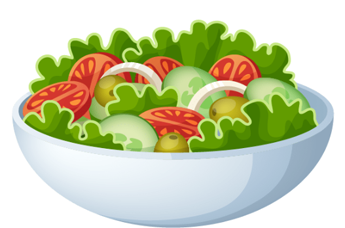Health Benefits of Eating Salad Every Day
Green salads are made mainly with leafy vegetables like lettuce, spinach, kale, arugula, or mixed greens. They can be combined with other ingredients such as vegetables, fruits, proteins, or grains and are usually topped with simple dressings like vinaigrettes.
Eating salad every day – or even a few times a week—can significantly improve overall health. Fresh salads are packed with fiber, antioxidants, vitamins, and minerals, making them an essential part of a balanced diet.

Why Eating Salad is Good for You
-
✅ Improves Gut Health: The fiber and polyphenols in leafy greens feed beneficial gut bacteria, supporting digestion and reducing the risk of chronic diseases like heart disease, cancer, and diabetes.
-
✅ Supports Heart Health: New research shows that nitrate-rich vegetables such as spinach, lettuce, and beets may lower the risk of stroke and heart attack.
-
✅ Regulates Blood Pressure: When digested, dietary nitrates convert into nitric oxide, which widens blood vessels and helps lower blood pressure.
-
✅ Reduces Risk of Atherosclerosis: A 15-year study published in the American Journal of Clinical Nutrition found that women who ate more leafy greens had less artery thickening and a lower risk of stroke.
Just one daily serving of leafy vegetables can make a difference in cardiovascular health.
To count as a single vegetable serving, you need to eat 2 cups of raw salad greens.
Nutritional Benefits of Salad
Low in calories, high in fiber → keeps you full for longer.
Boosts vitamin and mineral intake → especially a rich source of iron, folates, vitamin A, and vitamin K.
Encourages more fruits and vegetables in the diet → improving overall nutrient diversity.
Easy Ways to Make Salads Healthier
-
Use in-season produce for freshness and flavor.
-
Add fruits like apples, berries, or oranges for natural sweetness.
-
Include protein sources such as beans, tuna, chicken, or tofu.
-
Mix in whole grains like quinoa, couscous, or wild rice for added fiber.
-
Experiment with colorful vegetables – carrots, cucumbers, beets, squash—for crunch and variety.
-
Finish with a homemade vinaigrette instead of high-calorie bottled dressings.
Is Eating Salad Safe for Everyone?
For most people, salads are safe and beneficial. However, individuals with irritable bowel syndrome (IBS) or digestive issues may need to limit raw vegetables or stick with side salads instead of large portions, since too much fiber at once can cause discomfort.
Salad Safety: Preventing Foodborne Illness
Recent years have seen an increase in E. coli and Salmonella outbreaks linked to salad greens. This happens because leafy greens are often eaten raw.
Tips for Safe Salad Preparation and Use –
To enjoy the health benefits of fresh salads while avoiding foodborne illness, it’s important to follow proper salad safety practices:
-
Buy fresh produce from trusted sources to reduce the risk of contamination.
-
Refrigerate salad greens within 2 hours of purchase to keep them fresh and safe.
-
Wash your hands thoroughly before handling salad ingredients.
-
Use separate chopping boards, bowls, and utensils to prevent cross-contamination.
-
Rinse greens and vegetables under cold running water before eating.
-
Separate leaves carefully to remove hidden dirt and bacteria.
-
Consume salads soon after preparation for maximum freshness and food safety.
Read further on:
≺≺ Which food is most associated with helping people live longer?
≺≺ Is Plant-Based Protein the Key to a Longer, Stronger Life?
≺≺ How important is fiber in the diet?
≺≺ What role do probiotics play in the diet?
≺≺ What Is the Ketogenic Diet? Is the Keto Diet Right for Everyone?
≺≺ What cardiovascular benefits do berries provide?
≺≺ What is the Okinawan diet? What is the secret behind Okinawan long life-expectancy?
≺≺ Ultra-Processed Foods: What They Are, Why They’re Harmful, and How to Cut Back.
≺≺ What grains have the lowest glycemic index?
≺≺ How Important Is Protein for Your Health?
≺≺ is your kid getting too much protein?
≺≺ What foods and vitamins are good for your skin?
≺≺ EWG’s- The Clean Fifteen: Fruits and Vegetables with the Lowest Pesticide Levels.
≺≺ What eating strategies work best for losing weight long term?
≺≺ How Do Sugary Meals and Beverages Harm Dental Health?
≺≺ Why Vitamin B12 Is Important for Your Health?
≺≺ What foods should people with high blood pressure avoid?
≺≺ Why is regular table salt considered unhealthy?
≺≺ What food is most effective for moderating blood sugar?
≺≺ What are antioxidants? How antioxidants in the fruits and vegetables help in preventing cancers and diseases?
≺≺ How can I reduce the risk of cancer-causing chemicals when cooking or grilling meat?
≺≺ What happens to my blood vessels when I gain weight?
≻≻ Watch this page for more such informative articles on Health, Nutrition, and Wellness.
≻≻-Back to Home page.
Further reading (External Links opens in new window):
≺≺- WebMD – Health Benefits of Salad Greens.
≺≺- Harvard Health Publishing – A salad a day keeps stroke away?.

